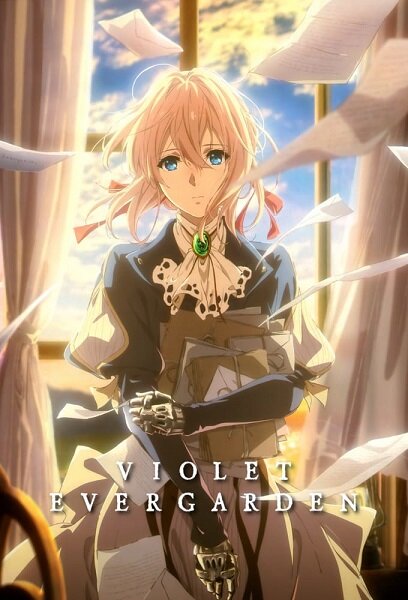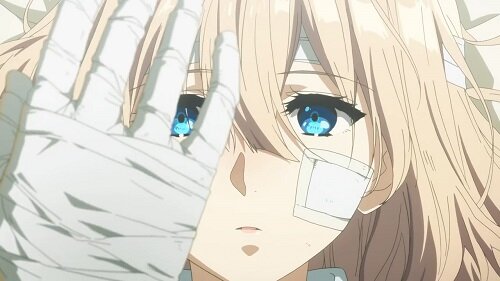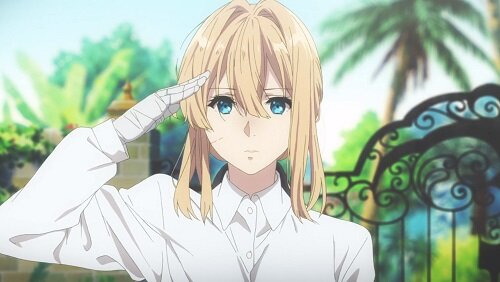Why 'Violet Evergarden' Is Probably My Favourite Anime
I first watched ‘Violet Evergarden’ in 2019, then in 2020 and, again, a couple of weeks ago for the third time.
Each viewing just makes me appreciate it more. Which got me wondering why I adore it so much.
Cue blog post…
‘Violet Evergarden’ started as a light novel series, written by Kana Akatsuki. It won the grand prize in Kyoto Animation Awards ‘novel’ category in 2014 and was published under its imprint in 2015.
In 2018, Kyoto Animation, or KyoAni, arguably one of the best animation studios, adapted the story into a 13-episode anime series.
Apart from those 13 episodes, there’s also an extra episode that was released after the series ended, which slots in somewhere before the end of the series.
There’s also a film, ‘Eternity and the Auto Memories Doll’, released in 2019 and another movie, ‘Violet Evergarden: The Movie’, released in 2020, the latter being the only one I haven’t seen as it hasn’t had an English language release yet.
My love of this series is based purely on the anime, as I haven’t read the light novels. Obviously written in Japanese, they haven’t been translated into English, but I do know there are differences between the books and the anime.
For the purpose of this post, I’ll be focussing solely on the 13-episode series.
I watched this in Japanese with English subs; despite the Western setting, it worked for me. I tried it in English, but while the voices were fine, I found some of the expressions used jarring as they were too modern for the setting.
This will be mainly spoiler-free, but in talking about Violet, there will be what some may consider SPOILERS.
The story revolves around the title character, Violet Evergarden. A child soldier, she has no memory of her life before she became a tool, a weapon of war. Seemingly devoid of emotion, she follows orders to kill without question.
It takes place in the fictional country of Leidenschaftlich in a setting similar to our early 20th century. Having just come out of a 4-year war, the country is adjusting to living in peace, but the aftermath of the conflict can still be seen and felt.
The story opens with Violet still in the army, looking at an emerald-green brooch and wondering at the feelings it evokes, which she doesn’t understand…
The scene fades before refocussing, again, on Violet but now she’s in a hospital bed, her hands wrapped in bandages.
With her fair hair and skin and blue eyes, she has an innocent, almost doll-like appearance.
She writes a report to her commanding officer, Major Gilbert Bougainvillea, stating she’s been in hospital for 120 days. As her recovery is progressing well, she awaits her next orders from him.
It’s interesting to note her focus is on her military duties; she doesn’t seem bothered by the state of her hands.
The next character we’re introduced to is Claudia Hodgins, who prefers to be called by his surname. He’s a friend of the major and has come to take Violet from the hospital.
Claudia Hodgins
When she asks after the major, Hodgins’ body language makes it plain all is not well, but Violet doesn’t understand emotions, so doesn’t pick up on it.
Instead, he tells her the major has asked him to take her to the major’s relatives, the Evergardens, who live in the capital, the port city of Leiden; they’ve agreed to take her in and care for her.
It’s there we see the true state of Violet’s hands. She’d lost both hands and arms in the last battle and has been fitted with metal prosthetics.
Realising the war is over and there’s no need for her to wait for orders from the Major, she loses her sense of purpose. All she knows is the war and acting on orders. Believing she is no longer needed she tells Hodgins she should be discarded.
Instead, he decides to take her to the company he’d set up after the war, the CH Postal Company, which not only delivers letters and packages but also provides a scribe service.
These scribes are known as Auto Memory Dolls, named after a mechanical typing doll a scientist had invented to enable his wife, who was a writer, to continue writing novels after she’d gone blind.
The scribes or Dolls help those who struggle to express their emotions by deciphering their true feelings, which is then expressed in a letter.
Giving her a purpose, Hodgins has her sort and deliver letters, which, given her training and precise nature, she excels at.
Violet watches a scribe help a client express his feelings to a childhood love and, as he falters to say what he truly means, the scribe suggests the words, “I love you”.
Stunned that the scribe knew what the man meant to say, Violet is gripped with the need to find out what those words mean.
She wants to become an Auto Memory Doll and when Hodgins asks her why, she says the Major said those words – ‘I love you’ – to her after he gave her, her last orders, but she doesn’t understand what they mean. She believes becoming a scribe will help her learn the meaning behind those words.
Hodgins supports her efforts and after a bit of a rocky start, so do her co-workers – the other Dolls, Cattleya, Erica and Iris, and the delivery guy, Benedict.
Cattleya Baudelaire
Iris Cannary
Erica Brown
Benedict Blue
And that’s basically what happens in the first episode.
Straightaway, Violet stands out from everyone else because of her military-like mannerisms and speech. It’s as if she doesn’t know how to be a civilian.
Although she picks up skills easily, probably because of her training, she has one major drawback, which is seen from the first episode – her inability to recognise and process emotions.
Violet is aware she has feelings but has no idea what they mean, so comes across as robotic and insensitive.
Violet’s metal arms and the use of words like ‘tool’, ‘weapon’, ‘doll’ – inanimate objects without emotion – emphasise her emotionless state.
Another thing we see in the first episode is her most precious possession – the aforementioned emerald-green brooch.
The Major had bought it for her after she’d chosen it because it reminds her of the colour of his eyes. Tellingly, she says, it makes her feel… something when she looks at it, but she doesn’t know what…
Even though the war and its aftermath are a running theme through the story, this is not an action-heavy anime.
It’s mainly episodic in nature, introducing different characters in most of the episodes, many of whom we only see in their respective episodes.
It is through these characters and what they’re each dealing with that Violet learns, as she writes their letters, of different types of love – between lovers, between parent and child, between siblings, between friends. She also learns of sadness, guilt, regret, happiness.
Weaving through these episodes are glimpses of Violet’s backstory, told in flashback, and how she came to be with the Major, Gilbert.
Major Gilbert Bougainvillea
Violet has no memory of her life, no memory of her family and believes she’s an orphan as does everyone else.
Gilbert is the only one who doesn’t see her as a ‘tool’ or weapon. He treats her kindly, takes care of her, teaches her to read and write. And names her Violet.
He becomes her whole world.
Despite his reluctance, he takes her into battle and her skills make her a valuable asset. Violet’s priority in every fight is to keep Gilbert safe, even if it means sacrificing his own men. She lives for his orders and perceives that – enacting his orders – to be her only reason for existing.
When Hodgins tells her she’s burning because she’s killed many, without thought or remorse, and has not dealt with it, she doesn’t understand what he means and he tells her, one day she will and then she will realise she has many scars left from those burns.
Comments by those in the military and ex-service personnel who’ve watched this series confirm the truth and authenticity of Violet’s reactions and trying to fit into civilian life.
Although I’ve never been in the military and never been in a battle, I am aware that soldiers are trained to follow orders, they’re trained to function efficiently in highly stressful situations, to remove empathy for the enemy, to be capable of killing another human being, to endure all kinds of horrors while wondering if they themselves will survive.
Granted, all this is exaggerated in Violet, but it helps the viewer understand a soldier’s life and subsequent return to civilian life. It also helps the viewer comprehend how much Violet is struggling to integrate into society without the sense of purpose the military provided her.
There’s a very good post, written by a military veteran, in which he explains this:
“Violet… lost her purpose, her place in the world. Violet had a clear mission and purpose until she became a casualty. With the war being over… Violet lost her purpose and guidance. She is adrift in the world. I understand this very well. There is no ‘come back to the civilian world’ class when you leave the Marine Corps, only a 3-day workshop on how to create a resumé, job interview tips, and crap like that. Then you are unceremoniously released.”
(Just so you’re aware, in his follow-up post, there are spoilers)
Although the viewer can work out, by the end of the first episode, that Gilbert didn’t make it back, Violet only finds out about halfway through the series. By then, she’s become more aware of emotions, even questioning whether she has the right to write the heartfelt letters she’s written given what she’s done.
Finding out Gilbert’s fate is the catalyst for her to face what she’s been through and the lives she’s taken. Her emotions – loss, anger, guilt – come surging to the surface.
Emotionally devasted, she even questions if she has the right to live.
It is in the episodes that deal with Violet facing the emotional tsunami of her loss that we see, more fully, her time with Gilbert.
We also see how he wrestles with the growing depth of his feeling for her and guilt that she’s fighting and killing because of him.
And we realise the enormity of what she’s lost as she finally understands what Hodgins meant by burning because of what she’s done.
So, what is it about this story that I love?
The writing is amazing as is the pacing. Although we only meet the different characters in their respective single episode, we’re soon invested in their emotional story.
We’re told just enough of what they’re dealing with. I believe it’s because many of us have most likely been through similar experiences – wanting to help someone we care about but not knowing how; being in love and wondering if the other person feels the same; losing a loved one; dealing with guilt – that we can relate.
These smaller emotional passages, formed around Violet’s own emotional arc, build toward a powerful conclusion without once becoming melodramatic or maudlin. I think that, in itself, is quite a feat. And it only works because we get to know the characters through genuine emotions.
Which brings me to Violet herself.
It’s not that she’s a blank slate with zero emotions. As I said, she knows she has emotions but doesn’t understand what she feels. She recognises her failures and wants to do something about it. Her character development is about recognising the different emotions and allowing herself to feel them.
It is through her interactions with others that Violet gradually learns how to recognise her own emotions and to realise they’re what make us human.
Though she doesn’t realise it, and it isn’t obvious to the viewer straightaway, Violet gives the people she meets something in return – in having to explain their feelings to her, they find themselves being more honest about how they feel.
With each episode we can see her progress, which is another thing I love about this anime. It doesn’t underestimate the viewer or feel the need to dumb down the narrative.
It requires us to have patience and expects us to give Violet time as she slowly unravels the mysteries of emotions.
‘Violet Evergarden’ is a story about having the courage to confront your emotions; about forgiving yourself for the things you’ve done.
It’s also a story about the way we communicate with one another.
We all know that we need to express our emotions when we communicate; we learn that as we grow, and we do it without thinking.
Violet, however, doesn’t understand her own emotions let alone other people’s. She’s great at the practical skill of typing, but not at interpreting what the client really wants to say because of the different layers we instil in our communication and the subtleties that come with that, and she hasn’t learned any of those.
How many times do we say one thing but really mean something else?
How many times do we say what we truly mean, how we really feel?
Not many do because that would make us vulnerable and being vulnerable requires immense courage as it leaves us open to being hurt.
As much as we want to express ourselves to others so they understand how we truly feel, to do so can be frightening, even emotionally painful.
Having grown up in the military, Violet had no need to learn these nuances; all she had to do was understand direct orders, which all mean exactly what they say.
She takes everything at face value and innocently points out when people contradict themselves, making for some embarrassingly eye-opening moments.
Visually, this anime is stunning. Not only are the characters beautifully portrayed in realistic detail, but the scenery is also breath-taking.
KyoAni is known for its attention to detail and it doesn’t disappoint, from the sweeping vistas to individual flowers.
And they did their homework with the weapons.
The Leidenschaftlich army’s weapons are based on those used by the German army in the First World War, namely the Luger and the Gewehr 98 rifle.
Loading a Luger
Violet firing her Gewehr 98 rifle
Close-up of the trigger on Lee Enfield No.1 Mk III
The evocative music highlights the emotional content but does so subtly.
‘Violet Evergarden’ has the uncanny ability to make viewers cry and I mean, really cry. This may sound weird, but I love how the anime doesn’t shy away from portraying raw emotion.
Although there are moments throughout that reduce me to tears, there is one particular episode that had me crying so much, I ended up sobbing and needing more tissues; I don’t remember ever crying like that for anything I’ve watched in my life. Even when I watched it the third time, knowing what was coming, I still ended up sobbing like a fool.
The final thing I love about this anime is the importance it places on letters. It’s a rare thing these days to write letters and to receive them, and I’m not talking official letters but personal, heartfelt ones.
Letter writing has become a lost art in this world of instant communication and that is such a shame.
It is through writing letters that Violet learns about her emotions, which helps her be more human. And it is through writing letters that others are able to connect with the ones they care about.
In this anime, letters serve another beautiful purpose – they are a way for people to express their feelings to loved ones who are no longer living, those they didn’t get a chance to say goodbye to, those who were lost in the war. And I find that such a powerful idea. How many of us who have lost loved ones always think, ‘there was so much I wanted to say’?
I remember when I first came to the UK in 1980, I regularly wrote to my parents and my sisters. I’d start the letter at the beginning of a week and add to it as the week progressed, almost like a diary, then post it the following week.
I still have and treasure the letters I got from my parents all those years ago.
A review video I watched ended with the guy reading a letter to his subscribers, which I thought was a lovely idea.
So, in the spirit of ‘Violet Evergarden’, I’ll end this with a letter…
Dear reader,
Thank you so much for taking the time to visit my blog and read my ramblings, which I enjoy researching and writing.
Even though we don’t connect in the ‘comments’ section, I know you’re there. I don’t write in the hopes that someone will comment as I know not everyone does and time is precious, but I know there are those who do stop by and that knowledge is enough for me.
I just want to say, I appreciate you and I hope you’ll continue to visit.
Take care.
Joy xx

















